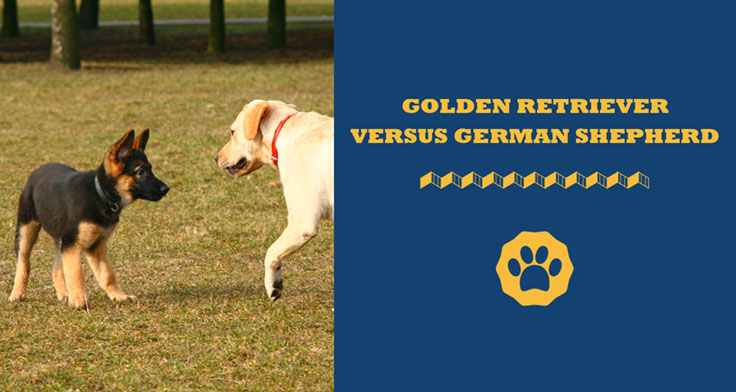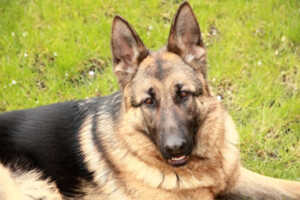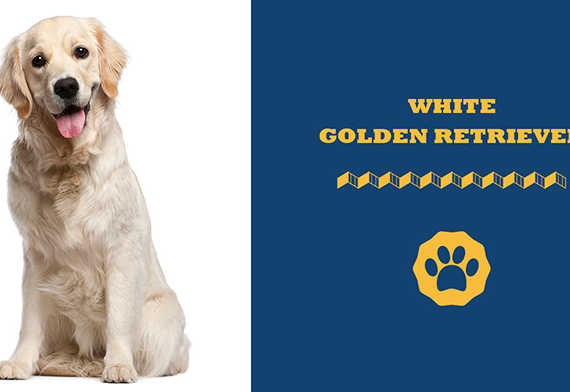This article contains affiliate links. Read the full disclosure here.

There are eight key differences between Golden retrievers versus German shepherds. Understanding these differences can help you decide which breed of dog is better suited to your lifestyle and your own temperament!
The key differences this article I’ll go over below are the dogs’ origins and their breed histories, how long each dog lives for on average, their overall size and appearance, their temperament and whether they are good to have around children, how trainable they are, their general health concerns, and what their grooming needs may be.
Golden retrievers are wonderful dogs who do well in a home that has regular (almost constant and free access) to their pets. Goldens need that connection with their owners.
German shepherds are fantastic dogs to own if you are looking for a dog that can occupy itself and is independent and confident in being alone.
Both dogs have their own health concerns, as all breeds do, and will need some dedicated grooming time at least once a week to deal with their shedding of their double coats. Let’s take a closer look at these breeds!
Let’s Take A Quick Look…
Let’s take a quick look at the eight key differences between Golden retrievers and German shepherds.
Characteristic | Golden Retriever | German Shepherd |
1. Breed History |
|
|
2. Lifespan |
|
|
3. Size and Appearance |
|
|
4. Temperament |
|
|
5. Good with children |
|
|
6. Trainability |
|
|
7. General Health |
|
|
8. Grooming Needs |
|
|
1. Breed History
The breed history of a dog considers its origins as a breed and how it came into being, as this impacts the nature of the dog and what type of family it is best suited for.
Golden Retriever
Golden retrievers hail from Scotland. These dogs were bred specifically to be gundogs and to retrieve birds that have been shot from a great distance. This means the Golden retriever has a very soft mouth and loves playing fetch.
Golden retrievers can be split into three different subgroups: Canadian Golden retrievers, American Golden retrievers, and British Golden retrievers. For a more detailed look at these groups, head on over to my article where I discuss their differences and similarities.
German Shepherd

The German shepherd dog is not generally associated with herding. However, that is precisely what they were bred to do! This German dog is also known as an Alsatian, as it received a very bad rap during World Wars I and II.
German shepherds were recognized for their intelligence and trainability, as there was a decline in the need for herding dogs, and so the breed was promoted as an all-purpose general working dog. Today, we know the dog as a law enforcement dog owing to its very protective and loyal nature.
2. Lifespan
Lifespan refers to how long a dog will live on average. A dog’s typical lifespan can vary significantly depending on the breed of dog and their size. In general, smaller dogs tend to live longer than larger breeds.
Golden Retriever
Golden retrievers live on average for 10 to 12 years. This number is often impacted by the fact that they live very comfortable and well-cared-for lives without much stress or labor.
German Shepherd
German shepherds live on average for 7 to 10 years. This average lifespan is often affected by the fact that these dogs often do dangerous work in law enforcement and serve as military dogs in K9 units. However, as a home dog, their average lifespan can be increased to roughly 12 years.
3. Size And Appearance
Golden retrievers and German shepherds are both medium-sized dogs. However, that is where their physical similarities end, as they are very different breeds.
Golden Retriever
Golden retrievers were bred to withstand cold temperatures and water, which means they have a long, luscious double coat. These dogs range in color from a light tan color to a deep rusty red.
Golden retriever males reach an average of 23 to 24 inches in height and weigh between 65 and 75 pounds. However, Golden retriever females reach an average of 21.5 to 22.5 inches in height and weigh between 55 and 65 pounds.
For a closer look at the development stages of Golden retrievers, have a look at my article where I detail each life stage.
German Shepherd
German shepherd dogs were bred to be fast, agile, and athletic. As a result, they have a powerful and sleek build. They also have a double coat which serves to protect them in icy German winters. They range in color from solid black to a mixed black and tan.
An adult German shepherd male measures at an average of 24 to 26 inches in height, and females reach an average of 22 to 24 inches in height. In terms of weight, male German shepherds usually weigh between 65 and 90 lbs, and females are between 50 and 70 pounds on average.
4. Temperament
The temperament or personality of a dog is very important to consider when choosing what breed is appropriate for your home and your lifestyle. Of course, this can vary between individual dogs even within the same breed, but breed is still a key indicator of a dog’s personality traits.
Golden Retriever

Golden retrievers are fun-loving, curious, devoted, and dependent dogs. They are highly social and open to welcoming strangers, both human and four-legged, into their home.
These dogs are very playful and need a significant amount of physical and mental stimulation. They do well when they have a pack structure to fall back on.
If your Golden retriever is trained properly, it can be a very calm and confident dog that is always happy to be your helper and best friend.
A Golden retriever’s temperament lends itself to be one of the best amongst service dogs in terms of disability and anxiety.
German Shepherd
German shepherds are confident dogs that can be rather independent. However, they are also highly sociable and fit in well with large families.
These dogs are very playful, just like a Golden retriever, and also need a huge amount of physical and mental stimulation to keep them from developing destructive behaviors.
If your German shepherd is trained properly, it can be as loving and calm as any other lap dog out there. A German shepherd’s temperament lends itself to be an all-round working dog that will be your protector and your best friend.
5. Good With Children
Certain dog breeds are perceived to be good or bad for children. It is not necessarily the breed of dog that is good or bad for the child; it is their level of training and the care the child takes in interacting with the dog.
There are no bad breeds of dogs, only bad owners.
Golden Retriever
Goldens are a very predictable breed of dog, and they predictably love being around large families and children. Their patient, loving temperaments make them excellent with young children and large groups of people.
German Shepherd
German shepherds also happen to be a very predictable breed, and they also predictably love being around children.
Is important to educate children on how to interact with a dog, especially a medium-to-large breed like Golden retrievers and German shepherds. Children should be taught not to pull on coats, tug on ears, or sit on the back of a dog, as this hurts the dog and stresses them out.
6. Trainability
Both Golden retrievers and German shepherd dogs are generally considered to be more easily trainable than other breeds, owing to their level of intelligence and ability to comprehend complex commands.
Not all owners have the time to train their dogs properly, which is why there are many puppy training facilities available. It is simply up to the owners to reinforce what their puppies have learnt at school in the home.
Golden Retriever
Golden retrievers are very intelligent and are able to easily understand both verbal and physical commands. They are eager to please the people they love and enjoy having tasks to perform for their loved ones.
They are highly trainable but do not do well under severe pressure, as they are prone to anxiety.
German Shepherd
German shepherds are incredibly versatile when it comes to trainability. They can be trained to perform a wide variety of jobs and can comprehend complex commands both verbally and physically and in combination.
German shepherds can withstand a significant amount of stress, which means their training is often seen as more successful than other dogs, as they pick up on new commands much quicker.
7. General Health
It is important to consider the general health of a specific breed, as many breeds of dogs have genetic problems they are predisposed to. For example, Pugs and Pekingese are susceptible to breathing problems due to their brachycephalic faces, and Dachshunds are susceptible to a collapsing spine due to their long, narrow bodies.
Golden Retriever
Golden retrievers are subject to a range of hereditary conditions, such as elbow and hip dysplasia, early onset cataracts, retinal atrophy, some heart diseases, pigmentary uveitis, ear infections, and severe anxiety.
Reputable breeders will screen their dogs for these issues and will either let you know that their breeding stock has certain issues or they will not sell their dogs.
German Shepherd
German shepherds are predisposed to elbow and hip dysplasia as well as degenerative myelopathy. If you get your German shepherd from a reputable breeder, they will have screened for these conditions and will warn you of them or not sell the dog.
There is also a condition that German shepherd dogs often suffer from called bloat. This can cause their abdomen to swell with air, and this is life-threatening, as the air compresses the rest of the dog’s organs. If your German shepherd is experiencing bloat, they need to get to the vet as soon as possible.
8. Grooming Needs
All dogs need some level of professional and personal grooming care. The level of grooming care differs between breeds. Both Goldens and German shepherds require some degree of regular grooming.
Golden Retriever
Owing to the fact that a Golden retriever’s coat is thick and long, these dogs can suffer from significant matting. This means they will need to be brushed weekly and go to a professional groomer to get their coats trimmed every 6 to 8 weeks.
Golden retrievers have a double coat, which means they shed a lot. To reduce the amount of shed hair you will find on your carpet, couches, and clothing, maintaining their grooming schedule is essential.
German Shepherd
German shepherds also have a double coat, and they need to be brushed weekly to reduce the chance of the coat becoming impacted and pulling on the skin.
German shepherds go through seasonal shedding where their undercoat will shed heavily. Brushing them every second day during their shedding time will help speed up the process and get rid of old and itchy fur.
FAQs About Golden Retrievers And German Shepherds…
Are German shepherds and Golden retrievers recognized dog breeds?
German shepherds were recognized by the AKC in 1908 as a pure breed of dog.
Golden retrievers were recognized as a pure breed of dog in 1925.
Can I have multiple dogs if I have a Golden retriever or German shepherd?
Golden retrievers do very well with other dogs. They get along well and enjoy having a pack structure as well as having other dogs to keep them company and to help them exercise and be mentally stimulated.
German shepherds can also be well socialized with other dogs provided correct training is in place.
Wagging Away On Golden Retrievers vs. German Shepherds…
When deciding between Golden retrievers versus German shepherds, it is important to keep the key differences between the breeds in mind. Different breeds of dogs have different temperaments and are suited to different households and lifestyles.
To recap, the key differences between Golden retrievers and German shepherd are:
- Breed History
- Life Span
- Size and Appearance
- Temperament
- Good with children
- Trainability
- General Health
- Grooming Needs
Again, be sure to carefully review these breeds’ differences before choosing the one you’d like to bring home. This way, you can be prepared and know what to expect from your new dog and how to make them feel comfortable in their new home.



